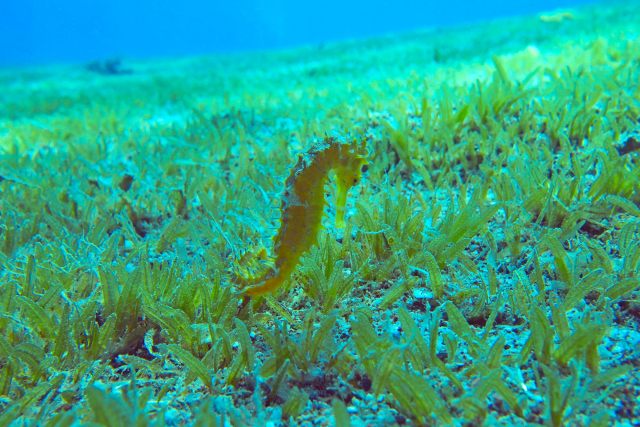13/03/2024 | The rise in sea temperature and salinity in the Mediterranean and the immigration of invasive species could endanger the structure and biodiversity of its seagrass meadows, which play an essential role in the marine environment. This is the conclusion reached by an international team of researchers led by the Leibniz Centre for Tropical Marine Research (ZMT) in a study recently published in the journal "Science of The Total Environment".
Global warming is increasingly leading to worrying changes in the ecosystems of the oceans. Even the Mediterranean is not spared. There, seagrass meadows are regarded as extremely important "ecosystem engineers": they create habitats, provide ecological niches for a large number of marine animal species and thus contribute to the general health and biodiversity of coastal ecosystems. They also have an important function as a CO₂ sink.
An international team of researchers led by the Leibniz Centre for Tropical Marine Research (ZMT) in Bremen has now investigated how the continuous rise in sea surface temperature and salinity as well as the unusually warm summer events will affect the seagrass meadows in the Mediterranean. They focused on one event in particular: an invasive seagrass species, Halophila stipulacea, which has migrated from the Red Sea, is spreading in the underwater meadows.
Together with the invasive species, the Mediterranean is home to five species of seagrasses, each of which has different ecological characteristics and environmental tolerances. The invasive Halophila is native to the Red Sea, Persian Gulf and Indian Ocean. It migrated through the Suez Canal into the Mediterranean. "The immigration of exotic tropical species through the Suez Canal has contributed to the Mediterranean being considered a hotspot for marine bioinvasions," says Pedro Beca-Carretero, biologist at the ZMT and first author of the study.
In their project, the researchers used a modelling approach that is suitable for simulating complex spatial biological and ecological processes. They developed different climate scenarios in which either only the native Mediterranean species, or the native together with the invasive species were either able to develop undisturbed or exposed to human influences.
The results indicate that the effects of climate change, in particular the increase in sea temperature and salinity, as well as the immigration of invasive species, could lead to a significant change in the Mediterranean seagrass community.
Impact on the biodiversity of the Mediterranean
"We expect a shift from long-lived, large species, such as the native Posidonia oceanica, to small and fast-growing species such as Cymodocea nodosa and the invasive Halophila," explains Beca-Carretero. "Posidonia is still the most common and iconic seagrass species in the Mediterranean - it forms extensive underwater meadows along the coast, especially in areas with shallow and sheltered marine conditions - but it has little dispersal ability, grows slowly and is very susceptible to stress. Halophila, on the other hand, is adapted to conditions in the Red Sea, which has high salinity and is one of the warmest seas in the world due to its enclosed nature and distribution in tropical and subtropical regions.
The changes could have an impact on the structure and function of the habitat of all those animal species that depend on seagrass meadows, and thus on the biodiversity of the Mediterranean. Seagrass meadows are home to a wide variety of creatures, such as different species of fish, crabs, shrimps, molluscs and other organisms. These meadows are of crucial importance for the life cycle of many species, as they provide shelter, feeding and breeding grounds as well as nurseries.
"It is quite possible that this will affect the health and resilience of the entire coastal environment in the Mediterranean," says Pedro Beca-Carretero. "This also affects people such as fishermen, restaurateurs and others who depend on this coastal habitat." The researcher plans to use the models developed for the study for other marine regions and marine ecosystems in order to assess the consequences of global environmental changes.
The project was funded by the Alexander von Humboldt Foundation and the Federal Ministry of Education and Research.
Publication
Pedro Beca-Carretero, Gidon Winters, Mirta Teichberg, Gabriele Procaccini, Fabian Schneekloth, Ramon H. Zambrano, Kelcie Chiquillo, Hauke Reuter, Climate change and the presence of invasive species will threaten the persistence of the Mediterranean seagrass community, Science of The Total Environment, Volume 910,





